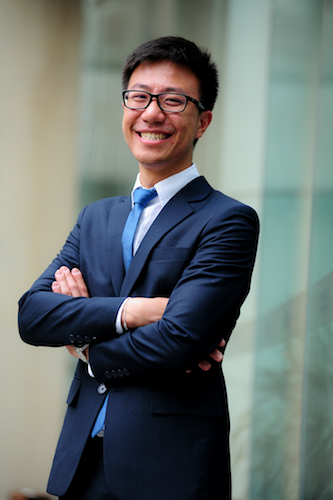Putt Thanakrit Thavorn-amornsri, GMBA Class of 2017

After
the recent convocation of the first cohort of Schwarzman Scholars, which was
created to educate the next generation of global leaders in the geopolitical
landscape, Schwarzman College opened its doors on September 20, 2016 for the
first time to the public. The newly opened school warmly welcomed Tsinghua
students to a public lecture given by Dr. Samuel Popkin entitled, “2016 U.S.
Presidential Election Insights and Analysis.” The lecture was part of the
Caterpillar Lecture Series in Public Policy, which is one of the main
disciplines the school upholds. The participants arrived slightly early to have
a brief tour around the school’s oriental yet modern architecture and
world-class education facilities and to interact with some of the Schwarzman
Scholars.
Dr.
Popkin is a Professor of Political Science at the University of San Diego as
well as an academic analyst of the U.S. presidential electoral process. Dr.
Popkin began his lecture by noting that the upcoming presidential election
would perhaps be the most interesting and unusual in modern U.S. history. Public
figures and politicians of both sides had voiced opinions and publicly endorsed
candidates, in some cases largely inconsistent with their former Democrat or
Republican preferences.
Putting
one’s personal political views aside, Dr. Popkin discussed in retrospect the
complexity and implication of the U.S. two-party political system, the parties’
“brand” management, the
background of the election campaigns, and the upcoming presidential debates
between Mrs. Clinton and Mr. Trump. It was quite interesting to hear candid perspective
from a notable scholar who has rich research expertise in the U.S. political
space. The phenomenon of Mr. Trump, transforming from real estate magnate to
probable candidate, was described as a highly strategic process. Although it
remained unclear who stood the best odds in the November election and whether national
conversations regarding issues such as immigration and economic policy could be
successfully addressed by the 45th President, Dr. Popkin left us
with deeper insights into modern politics.
As
the lecture concluded following many enthusiastic questions from the audience, we
walked out of Dalio Auditorium, the main underground lecture hall, which was
lined on its sides with 33 different flags that represent the 33 nationalities
– including my own – of the College’s first cohort. Taking in the unique
environment, I found myself inspired and eager to revisit the College whenever
the opportunity next arose.